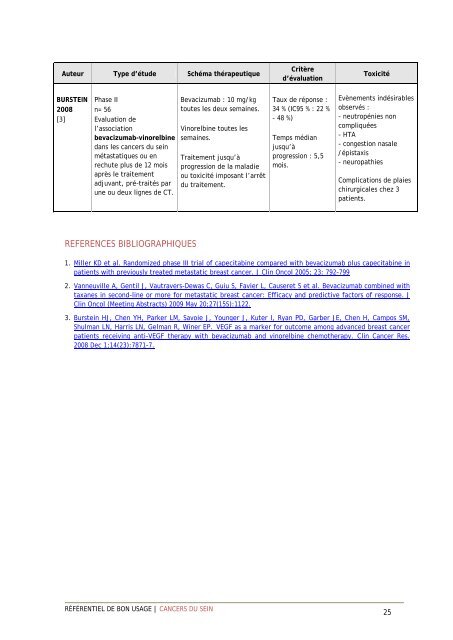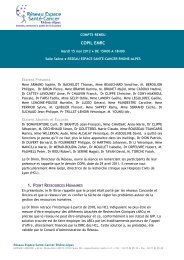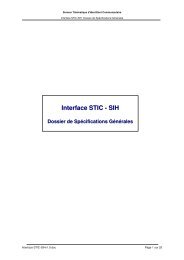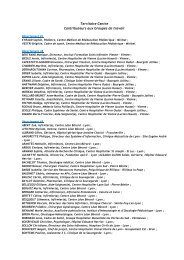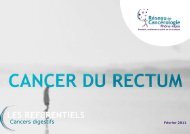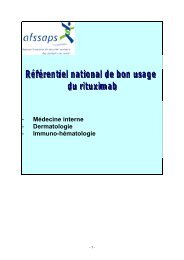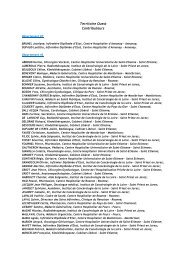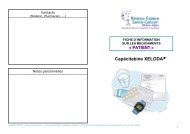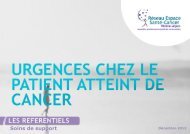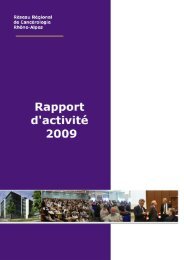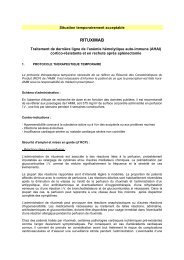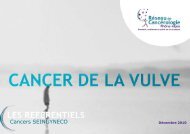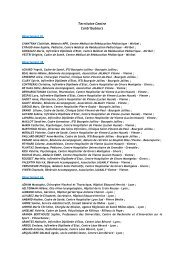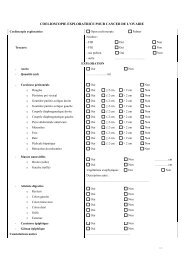CANCERS DU SEIN - Institut National Du Cancer
CANCERS DU SEIN - Institut National Du Cancer
CANCERS DU SEIN - Institut National Du Cancer
Create successful ePaper yourself
Turn your PDF publications into a flip-book with our unique Google optimized e-Paper software.
Auteur Type d’étude Schéma thérapeutique<br />
Critère<br />
d’évaluation<br />
Toxicité<br />
BURSTEIN<br />
2008<br />
[3]<br />
Phase II<br />
n= 56<br />
Evaluation de<br />
l’association<br />
bevacizumab-vinorelbine<br />
dans les cancers du sein<br />
métastatiques ou en<br />
rechute plus de 12 mois<br />
après le traitement<br />
adjuvant, pré-traités par<br />
une ou deux lignes de CT.<br />
Bevacizumab : 10 mg/kg<br />
toutes les deux semaines.<br />
Vinorelbine toutes les<br />
semaines.<br />
Traitement jusqu’à<br />
progression de la maladie<br />
ou toxicité imposant l’arrêt<br />
du traitement.<br />
Taux de réponse :<br />
34 % (IC95 % : 22 %<br />
- 48 %)<br />
Temps médian<br />
jusqu’à<br />
progression : 5,5<br />
mois.<br />
Evènements indésirables<br />
observés :<br />
- neutropénies non<br />
compliquées<br />
- HTA<br />
- congestion nasale<br />
/épistaxis<br />
- neuropathies<br />
Complications de plaies<br />
chirurgicales chez 3<br />
patients.<br />
REFERENCES BIBLIOGRAPHIQUES<br />
1. Miller KD et al. Randomized phase III trial of capecitabine compared with bevacizumab plus capecitabine in<br />
patients with previously treated metastatic breast cancer. J Clin Oncol 2005; 23: 792–799<br />
2. Vanneuville A, Gentil J, Vautravers-Dewas C, Guiu S, Favier L, Causeret S et al. Bevacizumab combined with<br />
taxanes in second-line or more for metastatic breast cancer: Efficacy and predictive factors of response. J<br />
Clin Oncol (Meeting Abstracts) 2009 May 20;27(15S):1122.<br />
3. Burstein HJ, Chen YH, Parker LM, Savoie J, Younger J, Kuter I, Ryan PD, Garber JE, Chen H, Campos SM,<br />
Shulman LN, Harris LN, Gelman R, Winer EP. VEGF as a marker for outcome among advanced breast cancer<br />
patients receiving anti-VEGF therapy with bevacizumab and vinorelbine chemotherapy. Clin <strong>Cancer</strong> Res.<br />
2008 Dec 1;14(23):7871-7.<br />
RÉFÉRENTIEL DE BON USAGE | <strong>CANCERS</strong> <strong>DU</strong> <strong>SEIN</strong><br />
25


